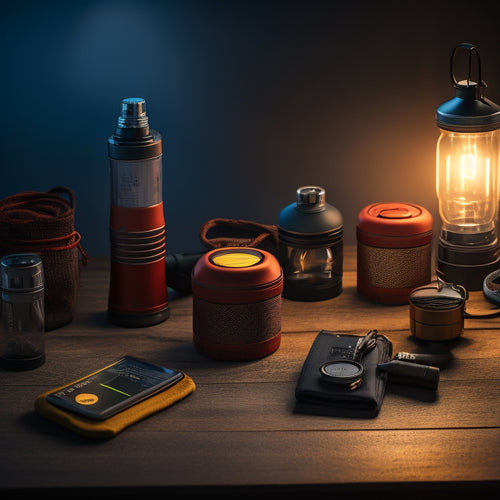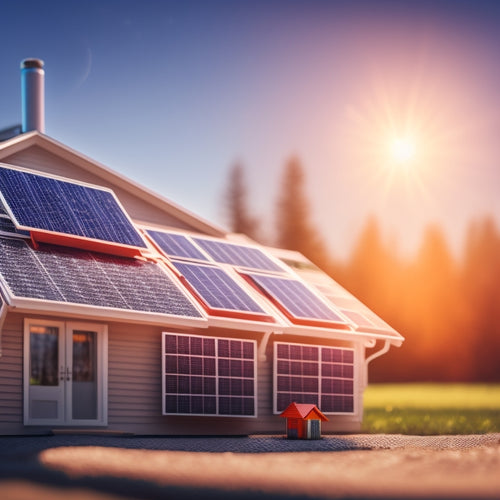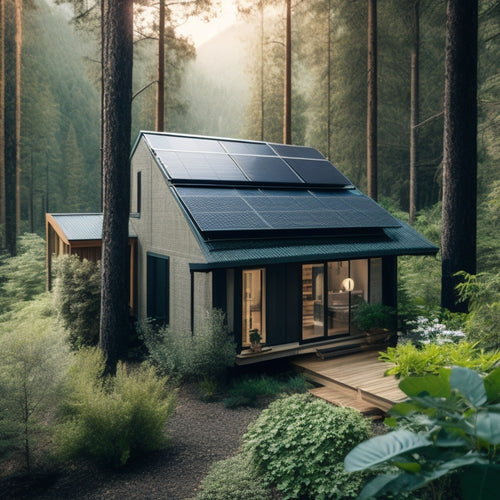
Best Commercial Solar Panels for Businesses
Share
When selecting the best commercial solar panels for your business, focus on efficiency and long-term savings. Monocrystalline panels shine with efficiency ratings between 15% to 22%, maximizing energy use even in limited space. Polycrystalline panels offer a balanced choice between cost and efficiency. Investing in durable panels with strong warranties guarantees longevity against the elements. With financial incentives like tax credits and rebates, moving to solar becomes even more accessible. Ultimately, you'll enjoy reduced monthly energy bills and a smaller carbon footprint. For a deeper understanding of your options, there's plenty more to uncover on how to make this switch effectively.
At a Glance
-
Efficiency Ratings: Choose monocrystalline panels for the highest efficiency (15%-22%) in limited spaces, while polycrystalline offers a cost-efficient balance (13%-17%).
-
Durability and Warranty: Opt for panels with robust warranties (25 years or more) to ensure long-term performance and protection against defects.
-
Financial Incentives: Take advantage of tax credits, rebates, and financing options to reduce the initial investment and enhance long-term savings.
-
Environmental Impact: Commercial solar panels significantly lower carbon emissions, supporting sustainability and improving brand reputation among eco-conscious consumers.
-
Energy Independence: Installing solar panels stabilizes energy costs, reduces reliance on the grid, and protects against rising utility expenses over time.
Cost-Effective Energy Solution
When you consider commercial solar panels, you're looking at a strategy that can lead to significant long-term savings on energy costs.
By utilizing solar energy, you not only reduce your monthly bills but also take advantage of various tax incentives and rebates that can further decrease your initial investment.
Additionally, incorporating financial incentives and accessibility makes the change to solar even more appealing for businesses.
This makes switching to solar not just an eco-friendly choice, but a financially savvy one as well.
Long-Term Savings Potential
Investing in commercial solar panels opens up an extraordinary potential for long-term savings, making it a smart choice for businesses seeking cost-effective energy solutions. By utilizing solar energy, you can greatly reduce your reliance on traditional energy sources, which are often subject to unpredictable price hikes.
With energy price trends increasingly leaning towards higher costs, solar panels provide a stable alternative, shielding you from market volatility.
When you incorporate solar technology into your business model, you're not just investing in infrastructure; you're making a strategic move in your financial forecasting. Over time, the cumulative savings on electricity bills can be substantial, allowing you to allocate those funds to other growth initiatives or operational needs.
Additionally, the lifespan of solar panels typically exceeds 25 years, meaning your initial investment pays off well into the future.
As you evaluate your energy options, consider the long-term financial benefits of solar energy. It's not just a trend; it's a smart, sustainable choice that enables you to take control of your energy expenses and promotes a greener future for your business.
Tax Incentives and Rebates
As you investigate the financial terrain of commercial solar panels, understanding the array of tax incentives and rebates available can greatly improve your cost-saving strategy.
Federal incentives, such as the Investment Tax Credit (ITC), allow you to deduct a significant percentage of your solar investment from your federal taxes. This means more money stays in your pocket, enabling you to reinvest in your business or expand your operations.
In addition to federal incentives, many states offer their own rebates and incentives to further ease the financial burden. These state rebates can vary widely, but they often include cash incentives or tax credits that make the initial investment more manageable.
By utilizing both federal and state programs, you can drastically reduce your upfront costs and accelerate your return on investment.
Don't overlook these financial tools when considering solar energy. By accessing available incentives, you not only lower your energy expenses but also position your business to thrive in a sustainable, cost-effective manner.
Accept the freedom that comes with utilizing solar power while enjoying substantial economic benefits.
Sustainable Energy Source
By choosing commercial solar panels, you're not just opting for a cost-effective energy solution; you're actively reducing your environmental impact.
This sustainable energy source not only decreases carbon emissions but also leads to significant long-term cost savings for your business.
Additionally, leveraging the benefits of solar energy can enhance your brand reputation and attract eco-conscious customers.
Embracing solar energy is a smart move towards a greener future and a healthier bottom line.
Environmental Impact Reduction
A notable shift towards commercial solar panels can drastically reduce your business's environmental impact. By utilizing the power of the sun, you can considerably lower your carbon footprint, contributing to a cleaner, healthier planet.
Solar energy is renewable, which means it won't deplete over time like fossil fuels. This change not only supports sustainability but also enhances your energy independence, freeing you from volatile energy markets and traditional utility companies.
Moreover, adopting solar panels demonstrates your commitment to environmental responsibility, which can connect with eco-conscious consumers. In today's market, businesses that prioritize sustainability often attract loyal customers who value companies that align with their values.
By reducing reliance on non-renewable energy sources, you're actively participating in the fight against climate change.
Investing in solar energy can position your business as a leader in sustainability, offering you a competitive edge. It's not just about saving the planet; it's about embracing a future where energy independence is attainable, and environmental impact is minimized.
Making this choice today can set the stage for a greener tomorrow, enhancing your brand's reputation while promoting a sense of freedom from the constraints of traditional energy sources.
Long-term Cost Savings
Switching to commercial solar panels can lead to significant long-term cost savings for your business. By utilizing the sun's energy, you can drastically reduce your electricity bills.
Many businesses find that their return on investment from solar systems typically ranges from 20% to 30%. This isn't just a one-off saving; it compounds over time, allowing you to reallocate funds to other areas of your business.
Additionally, with various solar financing options available, you don't have to bear the upfront costs alone. Many providers offer flexible payment plans customized to fit your budget, making the switch more accessible than ever.
Energy storage solutions can further enhance your savings by allowing you to store excess energy generated during peak sunlight hours for later use, reducing your reliance on the grid.
Key Specifications Overview
When considering commercial solar panels, understanding efficiency ratings is essential for maximizing your investment.
It's also important to evaluate the top-rated solar battery systems that can complement your solar setup, ensuring reliable energy storage.
You'll also want to pay attention to durability and warranty options, as these factors can greatly impact long-term performance and maintenance costs.
Efficiency Ratings Explained
Understanding efficiency ratings is essential for businesses considering commercial solar panels. These ratings provide understanding into how effectively a solar panel converts sunlight into electricity, helping you make an informed decision. By comparing efficiency ratings, you can determine which panel technologies best suit your energy needs and budget.
Here's a quick efficiency comparison of popular panel technologies:
| Panel Technology | Average Efficiency |
|---|---|
| Monocrystalline | 15% - 22% |
| Polycrystalline | 13% - 17% |
| Thin-Film | 10% - 12% |
| Bifacial | 20% - 25% |
Monocrystalline panels typically offer the highest efficiency, making them an excellent choice for businesses with limited roof space. Polycrystalline panels are often more affordable but may require more area due to slightly lower efficiency. Thin-film panels are lightweight and flexible, but their efficiency tends to lag behind other technologies. Bifacial panels, gaining popularity, capture sunlight on both sides, pushing efficiency even higher.
Durability and Warranty Options
Investing in commercial solar panels means you'll want to contemplate their durability and warranty options carefully. The longevity of your solar investment hinges on the quality of panel materials used. High-quality panels are designed to withstand extreme weather conditions, UV exposure, and physical impacts, ensuring they can deliver ideal performance over time.
When evaluating solar panels, look for those constructed with sturdy materials like tempered glass and aluminum frames. These materials not only enhance durability but also contribute to lower maintenance costs, allowing you greater freedom to focus on your business rather than repairs.
Warranty coverage is another essential factor. Most reputable manufacturers offer warranties that span 25 years or more, covering both performance and product defects.
A strong warranty indicates the manufacturer's confidence in their product, providing you with peace of mind.
Assessing Your Energy Goals
To effectively assess your energy goals, you first need to define your current energy consumption needs. Understanding these requirements will help you evaluate the long-term savings potential of commercial solar panels for your business.
Additionally, utilizing system design software can aid in planning and optimizing your solar panel system to match your energy demands. By aligning your energy usage with sustainable solutions, you can make a more informed investment decision.
Define Energy Consumption Needs
Regularly evaluating your energy consumption needs is essential for any business considering commercial solar panels. Understanding your energy goals begins with an energy audit, which helps you assess your current usage and identify consumption patterns. By analyzing these patterns, you can pinpoint peak usage times and areas where you might reduce waste.
To help clarify your energy needs, consider the following table:
| Energy Usage Factor | Description |
|---|---|
| Peak Demand | Highest usage times |
| Average Consumption | Monthly energy use average |
| Seasonal Variations | Changes in usage throughout the year |
| Future Growth | Anticipated increases in energy needs |
Evaluate Long-term Savings Potential
Many businesses overlook the long-term savings potential that comes with installing commercial solar panels. By evaluating your energy goals, you can access significant financial benefits.
Solar panel longevity is a key factor; many systems last 25 years or more, meaning your initial investment can yield savings for decades. As energy price fluctuations become increasingly unpredictable, relying on solar energy can provide stability and protection against rising utility costs.
Consider your energy consumption patterns and how solar can align with your needs. By generating your own power, you not only reduce your dependence on the grid but also insulate yourself from the volatility of energy prices. This proactive approach grants you the freedom to allocate funds elsewhere, ultimately encouraging growth for your business.
Additionally, many states offer tax incentives and rebates for solar installations, enhancing your savings potential even further.
When you adopt solar energy, you're not just investing in a power source; you're securing your business's financial future. Don't let the short-term costs deter you—focus on the long-term advantages, and watch how solar panels can change your energy strategy while improving your bottom line.
Higher Long-Term Savings Potential
When you invest in commercial solar panels, you're revealing the potential for considerably reduced energy costs over time.
By utilizing renewable energy, you can lower your dependence on traditional energy sources, which often come with fluctuating prices.
This shift not only stabilizes your expenses but also maximizes your long-term savings, making it a financially smart decision for your business.
Reduced Energy Costs
Investing in commercial solar panels not only helps your business reduce its energy costs but also sets the stage for higher long-term savings. By generating your own electricity, you're taking an essential step toward energy independence. This independence shields you from unpredictable utility rate fluctuations that can greatly impact your bottom line.
With solar panels, you can stabilize and even lower your monthly energy expenses. Instead of relying solely on traditional energy sources, you utilize the sun's power, which translates to predictable, manageable costs. This change allows you to allocate resources more effectively, enhancing your financial flexibility.
Moreover, as energy prices continue to rise, your investment in solar technology will increasingly pay off. You'll not only experience immediate savings but also enjoy the benefits of reduced operational costs over time. The initial investment in solar panels often leads to impressive returns, as many businesses see a substantial decrease in their energy bills within just a few years.
In essence, shifting to solar energy isn't just about reducing costs today; it's a long-term strategy that enables you to maneuver the energy market with confidence and freedom.
Frequently Asked Questions
What Are the Installation Timelines for Commercial Solar Panel Systems?
When planning your commercial solar project, expect the installation process to take 3 to 6 months. A clear project timeline helps you anticipate milestones, ensuring you achieve energy independence efficiently and effectively without unnecessary delays.
How Do Solar Panels Affect Property Values?
Imagine your property's value soaring like a bird in the sky. A property value analysis shows that solar investment returns often enhance market appeal, attracting buyers enthusiastic for energy savings and sustainable living, elevating your home's worth.
Are There Financing Options for Commercial Solar Panel Installations?
Yes, you've got various financing options for commercial solar panel installations. Leasing options can reduce upfront costs, while financing benefits like tax incentives and lower utility bills enhance your freedom and financial flexibility. Investigate what suits you best!
What Maintenance Is Required for Solar Panel Systems?
Imagine your solar panels as a garden; regular cleaning schedules and system inspections keep them thriving. Neglecting maintenance could dim their efficiency, so adopt this routine for a brighter, more sustainable energy future. You'll reap the rewards!
Can Businesses Receive Tax Incentives for Installing Solar Panels?
Yes, you can benefit from tax credit eligibility and renewable energy incentives when installing solar panels. These incentives greatly reduce costs, enabling your business to adopt sustainable energy while enhancing your financial freedom and environmental responsibility.
Explore More
In a world that increasingly values sustainability, investing in the best commercial solar panels can change your business into a guiding light of eco-consciousness. Just as the sun rises each day, so too can your energy savings soar with the right solar solution. By aligning your energy goals with these cost-effective and sustainable options, you're not just cutting costs; you're laying the groundwork for a greener future. Don't wait for the tide to turn—seize the opportunity to lead the charge today!
Related Posts
-

Best Solar Powered Flashlights for Emergency Situations
When you're choosing the best solar-powered flashlights for emergency situations, focus on their brightness, battery ...
-

A Beginner's Guide to Navigating the Solar Investment Tax Credit
You're eligible to claim a significant Solar Investment Tax Credit (ITC) of 30% of total installation costs, but mane...
-

Off Grid Solar Batteries
As you shift to off-grid living, you'll rely on high-performance solar batteries to store excess energy generated by ...


